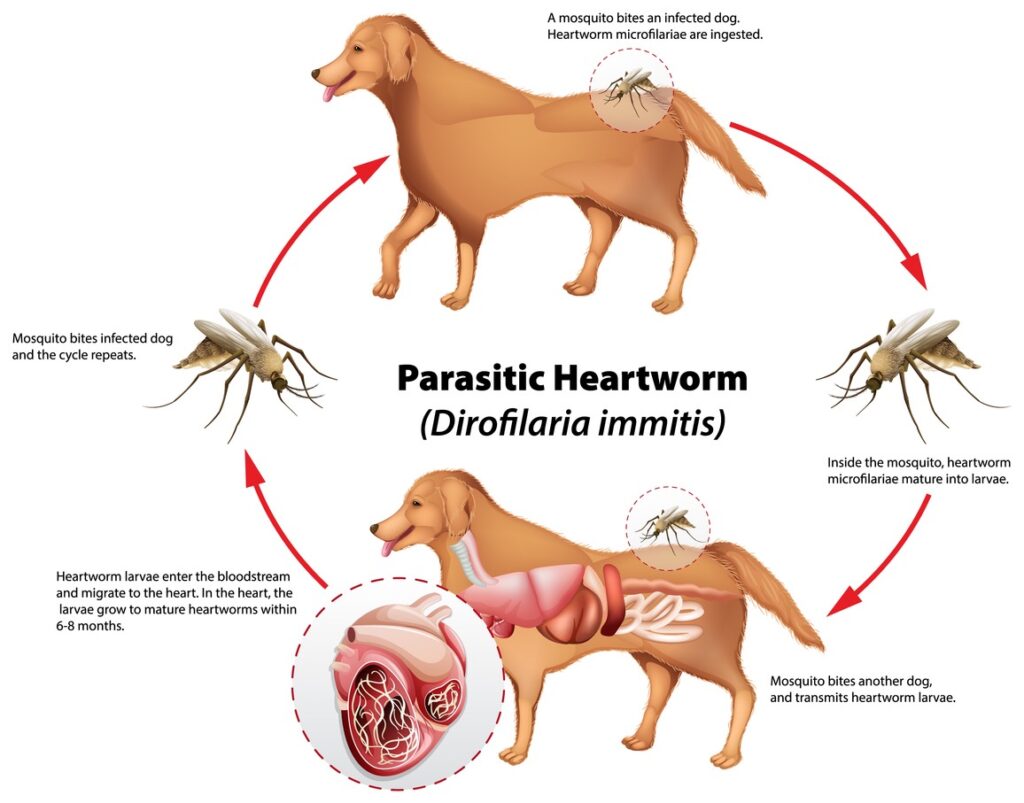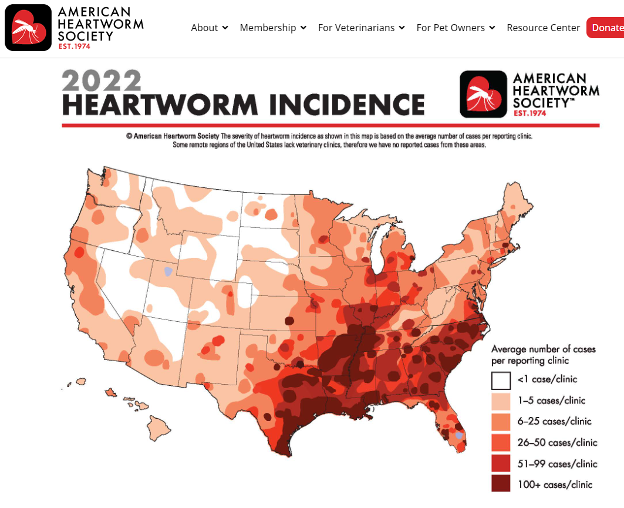We dedicate April as Heartworm Awareness Month to educate pet owners about the risks and consequences of heartworm disease. In observing Heartworm Awareness Month, we aim to raise awareness about the importance of prevention through regular testing and administering preventative medications. By highlighting the dangers of heartworms and promoting proactive measures, Heartworm Awareness Month strives to safeguard the health and well-being of pets worldwide.
The Lifecycle of Heartworms
Heartworm disease in pets begins with the bite of a female mosquito. When the mosquito bites a pet, it injects tiny worms into its body. These worms then travel through the bloodstream to the pet’s heart and lungs, where they mature and reproduce.

Common Misconceptions About Heartworm Disease
- One common misconception is that pets cannot get heartworm if they are kept indoors. Mosquitoes can easily find their way indoors; all it takes is one bite to transmit the disease.
- Some believe that if a pet has long or thick fur, a mosquito cannot penetrate the fur. However, a mosquito’s proboscis (mouth) has no trouble going through a thick layer of fur.
- A grave misconception is that the worms are too tiny to cause damage. When they enter the bloodstream from a mosquito bite, the worms are microscopic. However, once they reach the heart and lungs, they grow and multiply. Adult males can grow 4 to 6 inches, and females can reach 10 to 12 inches in length
- The average number of worms in an infected dog is 15, but some dogs have had up to 30 heartworms
Symptoms and Signs of Heartworm Disease in Pets
Pets infected may not show any signs until the disease has progressed to a more advanced stage. Significant damage may have already occurred to the heart, lungs, and other organs by this time. Below are the symptoms the American Heartworm Society lists for dogs, cats, and ferrets:
Dogs:
- Mild, persistent coughing
- Reluctance to exercise
- Fatigue after moderate activity
- Decreased appetite
- Weight loss
As heartworm disease progresses, dogs may develop heart failure and the appearance of a swollen belly due to excess fluid in the abdomen.
Cats:
Signs of heartworm disease in cats can be very subtle or very dramatic. Symptoms may include:
- Coughing
- Asthma-like attacks
- Periodic vomiting
- Lack of appetite or weight loss.
- Occasionally, an affected cat may have difficulty walking, experience fainting or seizures, or suffer from fluid accumulation in the abdomen.
Ferrets:
- Decreased appetite
- Weight loss
- Paralysis of the hind legs
- Enlarged abdomen
- Dark-colored urine
Sadly, in some cases, the first sign is the sudden collapse or death of the cat or ferret.
Diagnosis and Testing for Heartworm Disease
Early detection of heartworm disease is crucial for successful treatment and prevention of further complications. We typically perform a series of tests to diagnose heartworm disease, including a blood test that detects the presence of adult heartworms or their offspring. Imaging techniques like X-rays or ultrasounds can tell us the extent of the infection.
Treatment Options for Heartworm Disease
Treatment for dogs involves medication, rest, and close monitoring by veterinarians, sometimes requiring surgery.
Unfortunately, no approved drug therapy for heartworm infection in cats or ferrets exists, and the drug used to treat infections in dogs is unsafe for them. Nevertheless, we can often help cats and ferrets with good veterinary care. The goal is to stabilize your pet and determine a long-term management plan.
Heartworm Does Exist in Pennsylvania

The AHS conducts an annual heartworm incidence survey, working with veterinary practices and shelters that submit data from heartworm antigen tests run over the previous year. The latest survey was conducted in early 2023 and reflects data from testing conducted during 2022. The map shows that pets are at risk for heartworm in Pennsylvania.
Heartworm Prevention
Heartworm medications help protect your furry friends from heartworm disease’s severe and sometimes fatal consequences. These preventives effectively disrupt the heartworm lifecycle, preventing the larvae from maturing into adult worms that can wreak havoc on your pet’s cardiovascular system. Whether in the form of chewable tablets, topical solutions, or injections, we tailor these preventive treatments to suit your pet’s needs based on factors such as age, weight, and health status. By ensuring your pets receive their preventive medication monthly, you’re safeguarding their well-being and contributing to the collective effort to curb the spread of this silent threat.
Do You Need a Prescription for Heartworm Medication?
The answer is YES! Here is the reason from the AVMA:
“Heartworm preventatives are labeled as “prescription-only” because it’s critical that your veterinarian makes sure the medication is the right one based on your pet’s health status. Heartworm preventatives target infective larvae as they are migrating through the tissue prior to reaching the bloodstream and developing into adult heartworms. If your pet already has adult heartworms, giving a preventive medication will not effectively treat the disease because the preventives don’t readily kill adult heartworms.”
Also, giving a heartworm preventive to a pet infected with adult heartworms may be harmful or deadly. If microfilariae are in the pet’s bloodstream, the preventive may cause the microfilariae to suddenly die, triggering a shock-like reaction and possibly death in the pet.
The Importance of Regular Veterinary Check-Ups
Regular veterinary check-ups are essential for maintaining your pet’s overall health and well-being, including protection against heartworm disease. During these visits, your Pine Creek Animal Hospital vet can perform routine screenings for heartworm infection, assess your pet’s overall health, and provide guidance on preventive measures. She can also address any concerns or questions regarding heartworm disease or other potential health issues.
Guarding Your Furry Friends: Year-Round Vigilance Against Heartworm Disease
In conclusion, Heartworm Awareness Month emphasizes the critical need for constant alertness against heartworm disease no matter the time of year. By understanding the symptoms and risks associated with this condition, you can take proactive measures to protect your pets from this dreadful and potentially fatal disease. Moreover, our commitment to heartworm prevention through regular testing and routine veterinary care underscores our dedication to safeguarding the health and well-being of pets in Gap, Lancaster, and the surrounding communities. Together, let us continue to spread awareness and advocate for the health and happiness of all furry companions.
Your Caring Team
Pine Creek Animal Hospital



0 Comments